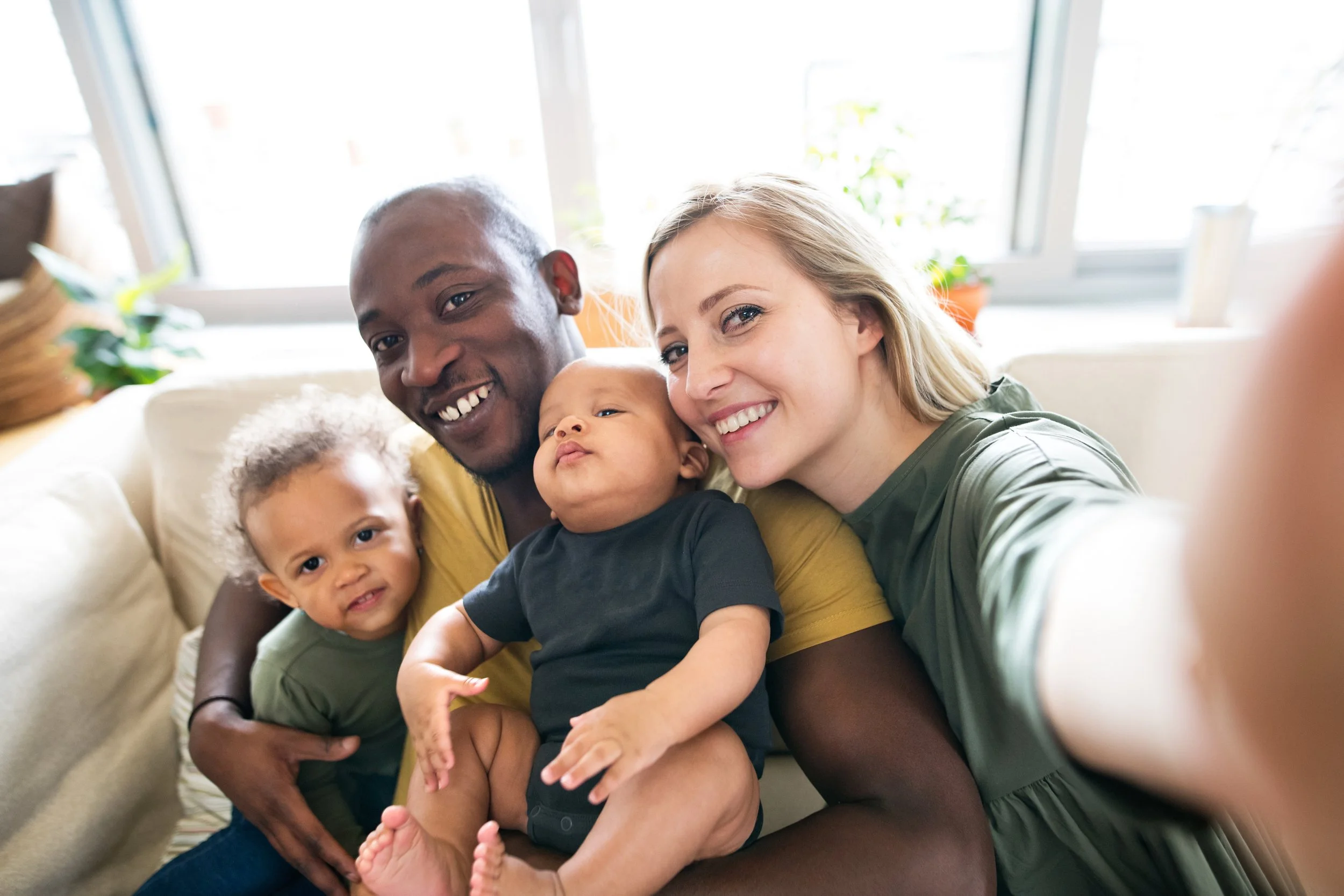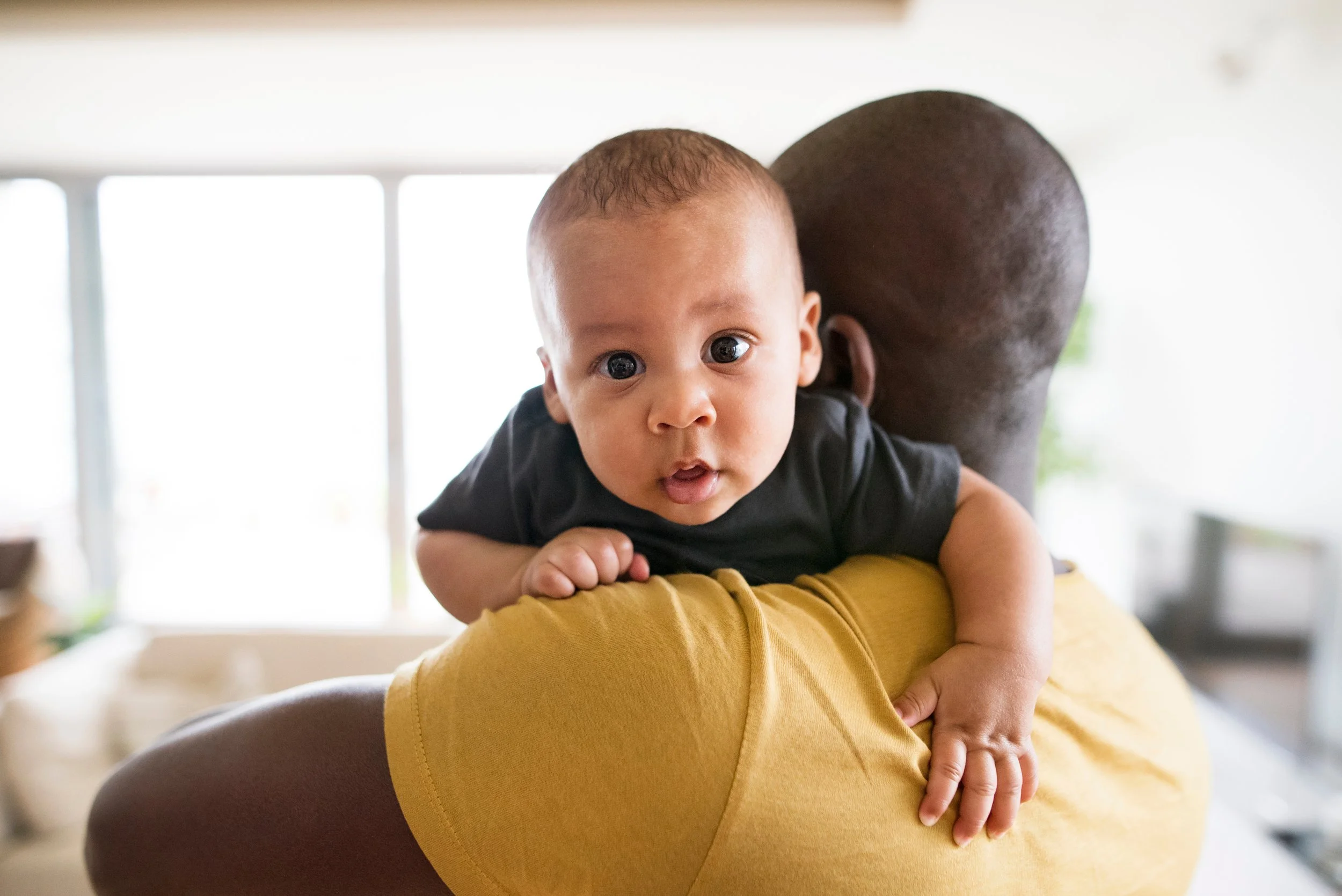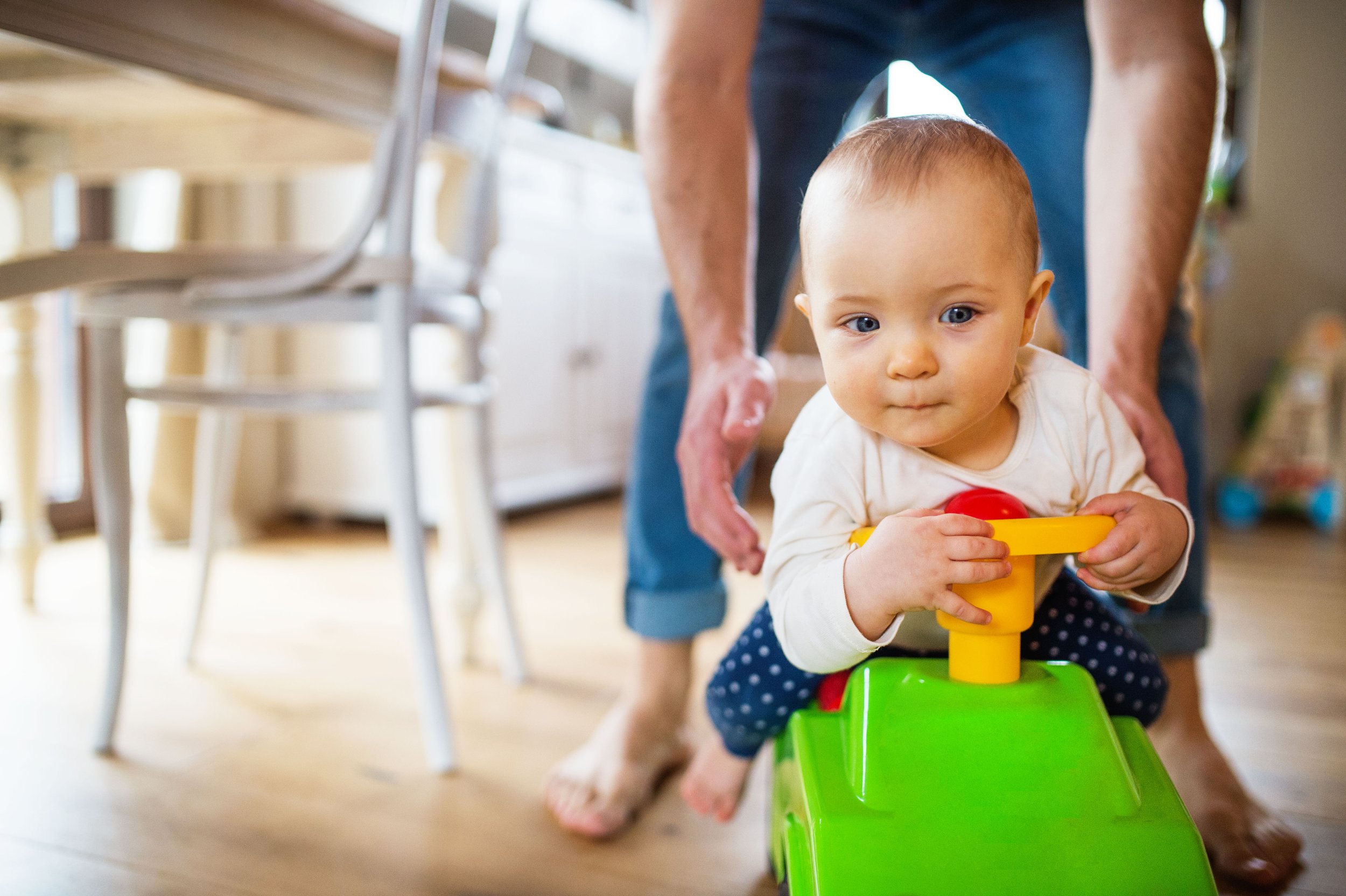When do babies start babbling?
Babbling is your baby’s way of getting ready to talk!
It’s a complex skill that changes and evolves over time as your baby’s speech system develops. You may have already noticed how your baby’s sounds are changing over time and I’m excited to help you identify the different types of babbling.
Because babbling is such an important milestone for babies, parents often have a lot of questions about it! Parents who I’ve worked with often ask:
Maybe you have some of these same questions too.
You can click any of the links above to hop straight to the answer if you’re looking for something specific.
I am going to answer each of these questions plus share tons of helpful information about babbling so you can nerd out with your mom friends and celebrate how hard your baby is working as they move through the stages of babbling.
What is babbling?
Babies develop quickly and make a lot of different sounds, so let’s start by talking about what exactly counts as babbling.
Babbling is the term used to describe the repeated strings of consonant and vowel sounds babies say. Babbling has no meaning (they aren’t saying words), but it has a very important function! When babies babble, they are figuring out how to move their mouth in different ways to pronounce different sounds. Babbling is a warm up for talking and an important stage in language development!
But babies don’t start babbling until they are about 4 to 9 months old; and your baby's babbles aren’t the first sounds they make. There is an important milestone skill that precedes babbling - cooing.
When do babies start cooing?
Babies start cooing around 6 to 8 weeks of age.
Cooing sounds are the vowel-like sounds that babies make in the first 3 months of their life, they may sound like, “oooo” or “aaaa”. A good way to think about cooing is that coos are the first non-crying sounds a baby makes.
The early “cooing” sounds your baby makes are the precursor to babbling. Babies coo before they babble because coos are the simplest and easiest sound to make. When babies are cooing they aren’t moving their lips or tongue in any coordinated way; they are just making sounds.
But I don’t want to underplay the importance of cooing! Babies are learning a very important skill when they coo: how to turn on their voice.
In order for us to make sounds and talk we have to coordinate our breathing so that our vocal cords vibrate together when we breathe out. This is the foundation for talking! And this is what babies are learning when they are cooing.
Fun Fact:
Did you know that laughing is another way that your baby is practicing with their voice box! Babies begin laughing after they’ve started cooing, usually around 3 to 4 months old.
Babies make some consonant sounds before they babble
Before babies can begin to babble, they must learn to pronounce some consonant sounds.
Between the ages of 4 to 6 months babies begin producing some consonant sounds and start saying single syllables, like “ba” “ma” “ga” or “bu.” Speech therapists refer to this stage of development as vocal play.
Vocal play is all about your baby learning to use their tongue, teeth, and lips intentionally to try to copy sounds they have heard you say! This is a critical stage in babies’ speech development.
Sounds like raspberries are also common during this stage as babies are experimenting with how they can make so many different sounds with their mouth.
When do babies start babbling?
The quick answer - Babies begin babbling between the ages of 6 to 9 months.
Here’s a little more on when babies start babbling.
Once babies have learned to coordinate their voice and some of the movements of their mouth, they begin to combine syllables together and babble!
Babbling evolves and changes as your baby practices with their sounds over time. As they improve their coordination, they begin to use a bigger variety of sounds.
What are the stages of babbling?
There are two stages of babbling:
Reduplicated Babbling
In the beginning, babies repeat the same sounds over and over. Early babbling sounds like, “ba-ba-ba-ba-ba,” “da-da-da-da” or “ma-ma-ma-ma-ma.” Speech therapists refer to this type of babbling as reduplicated babbling. Reduplicated babbling often emerges between the ages of 6 to 8 months old.
Non-reduplicated or Variegated Babbling
Babies start to mix things up! Around 10 months babies begin to combine different vowel sounds and different vowel sounds, rather than just repeating the same sounds over and over. Non-reduplicated babbling may sound like, “ba-ba-di-da” or “bo-mo-do-gi.”
Babbling is the universal precursor to talking and a very important developmental stepping stone for babies learning to talk!
Fun Fact:
The most common baby first words, like “mama” or “dada” closely resemble the sounds babies when they are babbling, because these are the sounds they have the most practice with.
What about canonical babbling?
A researcher named Dr. Oller and his colleagues defined canonical babbling as the earliest formation of syllables, or any well formed production of at least one vowel and one consonant together [1].
Canonical babbling is synonymous with reduplicated babbling. The two terms are used interchangeably in the world of speech therapy.
Are the stages of babbling the same if my baby is learning another language?
Babbling will sound a little different depending on which language(s) a baby hears. Babies who hear English are working to learn English sounds, while babies whose parents speak Japanese are trying to learn Japanese sounds.
Irregardless of the languages a baby is exposed to they will almost always copy sounds made with your lips before other consonant sounds; that’s because they are the easiest to copy. Babies can clearly see how adults move their mouth and try to copy lips sounds, like “m” “p” and “b.”
And if you speak more than one language in your house there is no need to worry! Research shows that speaking more than one language does not delay babbling! Bilingualism and multilingualism should be embraced and celebrated!!
How to encourage babbling
Now that you’ve learned about the stages of babbling, you know what an important role it plays in your baby’s early development of communication. And by now, most of you are probably curious how to encourage your baby to babble.
I am going to share 3 simple and fun ways that you can do to encourage babbling:
Imitate your baby’s sounds - Imitation is an important skill for babies and toddlers learning to talk. Babies will learn to talk by copying words we say, but first they have to learn the skill of imitation. And babies learn to imitate us, by watching us imitate them! We can imitate each others’ facial expressions, coos, and early sounds. And lots of parents feel silly saying baby sounds at first, but it is such a great way to enrich your child’s language learning (and no one is probably watching ;) ).
Sing songs - You may have noticed that your baby changes their tone of voice when they coo or babble. In speech therapy terms we would say they are changing their intonation. Babies pick up on changes in the volume and pitch of our voices, and they try to copy that! Songs naturally have a lot of rhythm which catches babies attention. You may notice your baby babbling along with a song or trying to match the rhythm.
Face each other - You may think this sounds super obvious, but being face to face is one of the best ways to encourage babbling. Holding your baby on your lap so they can see your face is a great way to help them see your mouth and all its movements. When your baby is able to easily see how your mouth moves they might try to copy you! Peek-A-Boo and tickles can be two really fun play activities for babies when you’re naturally face to face and you can encourage babbling and early sounds.
What to do if you’re worried about your baby’s babbling?
If you have concerns about your baby’s babbling, my advice is always to talk to your baby’s pediatrician. Remember that most babies start babbling between the ages of 6 to 9 months.
That doesn’t mean you have to wait to talk to your pediatrician if you’re concerned. I always say there is no risk in asking questions or asking for help, but there is a potential risk in waiting. You don’t need to feel embarrassed or ashamed to ask; we’ve all been there. And if everyone knew just what to do there would be no need for all the pediatricians or speech therapists out there :)
If you notice your baby isn’t cooing, babbling, or making early sounds, their pediatrician will likely recommend a hearing test. Young children are at higher risk for ear infections and it’s important to make sure that their ears are working well and they are hearing all the sounds you’re making.
You can read more about pediatric hearing tests with audiologist Dr. Michele Hu here: Why does my toddler need a hearing test.
In addition to a hearing test, the pediatrician may recommend some speech therapy or early childhood classes. Your pediatrician will be able to make the best recommendations for your child specifically!
Another resource you may take advantage of is your state’s early intervention program. Early Intervention supports all children under the age of 3 years old. You can receive hearing tests and speech therapy through these programs. Here’s a link to learn more about early intervention through your state’s free program: Read more!
Other commonly asked questions:
What’s the difference between babbling and cooing?
Cooing is the stage that comes before babbling in baby vocal development. Cooing consists of only vowel sounds, while babbling contains both consonants and vowels.
Can babies coo at 4 weeks?
At 4 weeks old babies communicate through crying and they will respond with a startle response when they hear loud noises. Babies start cooing and smiling around 6 weeks old, but you may see some signs of them developing these skills near their 1 month birthday.
Should my baby be babbling at 2 months?
Nope, babies will begin cooing around 6 to 8 weeks old, and laughing too! These early sounds are the first non-crying sounds babies will make. Cooing is different from babbling because there are no clear consonant sounds (like “m” or “b”) when babies coo; it sounds like “aaaaaaaa” or “aaaa-oooo.”
Do babies babble at 3 months?
Maybe, but most babies are not babbling yet at 3 months. It’s more likely that your baby is cooing at 3 months and not babbling. 3 month olds may begin to make some consonant sounds through vocal play (figuring out how to move their mouth), but they are still in the discovery stage and preparing to babble in the coming months.
When do babies start talking?
Babies start talking, or say their first words, between the ages of 10-14 months old.
To learn more about when babies start talking, continue reading here.
Suggested Next Reads:
© 2020-2025. Stephanie Keffer Hatleli, MS CCC-SLP. All Rights Reserved.
Works Cited:
Oller DK, Eilers RE, Neal AR, Cobo-Lewis AB. Late onset canonical babbling: a possible early marker of abnormal development. Am J Ment Retard. 1998 Nov;103(3):249-63. doi: 10.1352/0895-8017(1998)103<0249:LOCBAP>2.0.CO;2. PMID: 9833656.
The content offered on ToddlerTalk.com is for informational purposes only. Toddler Talk is not engaged in rendering professional advice, whether medical or otherwise, to individual users or their children or families. No content on this site, regardless of date, should ever be used as a substitute for direct medical advice from your doctor, speech language pathologist, or other health professional. By accessing the content on ToddlerTalk.com, you acknowledge and agree that you are accepting the responsibility for your child’s health and well-being. In return for providing you with information related to home speech and language practice, you waive any claims that you or your child may have as a result of utilizing the content on ToddlerTalk.com.








